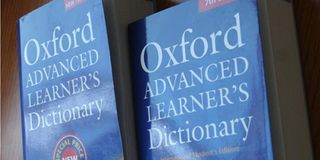This is how to use an adverb in a correct sentence

Copies of Oxford Advanced Learner's dictionary. PHOTO | PHOEBE OKALL | FIEL |
What you need to know:
- A quick look at those adverbs will tell the intelligent reader that, if you remove the “ly” element, what you remain with are adjectives.
- One method by which you form an adverb is to add an “ly” to an adjective.
- Derived from the French adjective vrai (“true”), the English word very used to be an adjective, nothing else.
Consider the following headline in the April 24 number of the Sunday Nation: “Why Kibaki wants the bank he ‘sold’ for Sh20 back”.
The question is: Isn’t it difficult to imagine Mwai Kibaki — an economist and former Finance minister in a money-enslaved country like ours — seeking to buy a whole bank for a quid?
But this column does not answer such questions. What concerns me is the sequencing of the words in that sentence.
The problem is that the adverb back is situated too far away from the verb wants which it is supposed to describe. But the question remains: How does Mr Kibaki want the money? The answer: “back”.
Yet the fact that, here, the word “back” is an adverb may surprise the run-of-the-mill reader.
Most Kenyans who have gone to school will frequently have heard that English adverbs end with an “ly”. They will be familiar with adverbs like quickly, formally, formerly, greedily, haphazardly and stupidly.
Yet a quick look at those adverbs will tell the intelligent reader that, if you remove the “ly” element, what you remain with are adjectives.
In other words, one method by which you form an adverb is to add an “ly” to an adjective.
But be careful because many English adverbs don’t come from adjectives and, therefore, have an “ly” ending.
Examples include often, seldom and very. All these are already adverbs and, therefore, do not require the ly suffix. Often, for example, does not need an ly because it already means the same thing as frequently. In short, there is no such word as oftenly.
HIGHLY EDUCATED USERS
Yet when, many years ago, I worked as the Nation’s editorial copy reviser, chief sub-editor and, briefly, managing editor of the daily, I came across the word “oftenly” again and again from the mouths and pens even of some of Kenya’s most highly educated users of English, including otherwise deeply knowledgeable academics of the University of Nairobi.
I say “very highly educated” because English was (and remains) the medium of all academic instruction in practically all of England’s former colonies worldwide. Note, in that sentence, that the adverb highly qualifies the adjective educated, but that the adverb highly itself is, in turn, qualified by another adverb, very.
Derived from the French adjective vrai (“true”), the English word very used to be an adjective, nothing else. For instance, Carey Francis was the very man who taught me all the mathematics that I know. But very has also become increasingly adverbial — posing questions as to why Old English coined the form verily — another adverb common especially in religious texts.
Thus “verily, verily, I say unto you...” is a frequent invocation from the mouth of the Jesus called Christ, the superstar of the Euro-Christian New Testament. It means: “Please do pay attention to the truth that I am about to tell you.”
Empedocles, Siddhartha Gautama (the Buddha), Dedan Kimathi, Gor Mahia, Moses, Muhammad, Pythagoras, Socrates and other prophets worldwide used similar words to arrest attention to what they were teaching.





